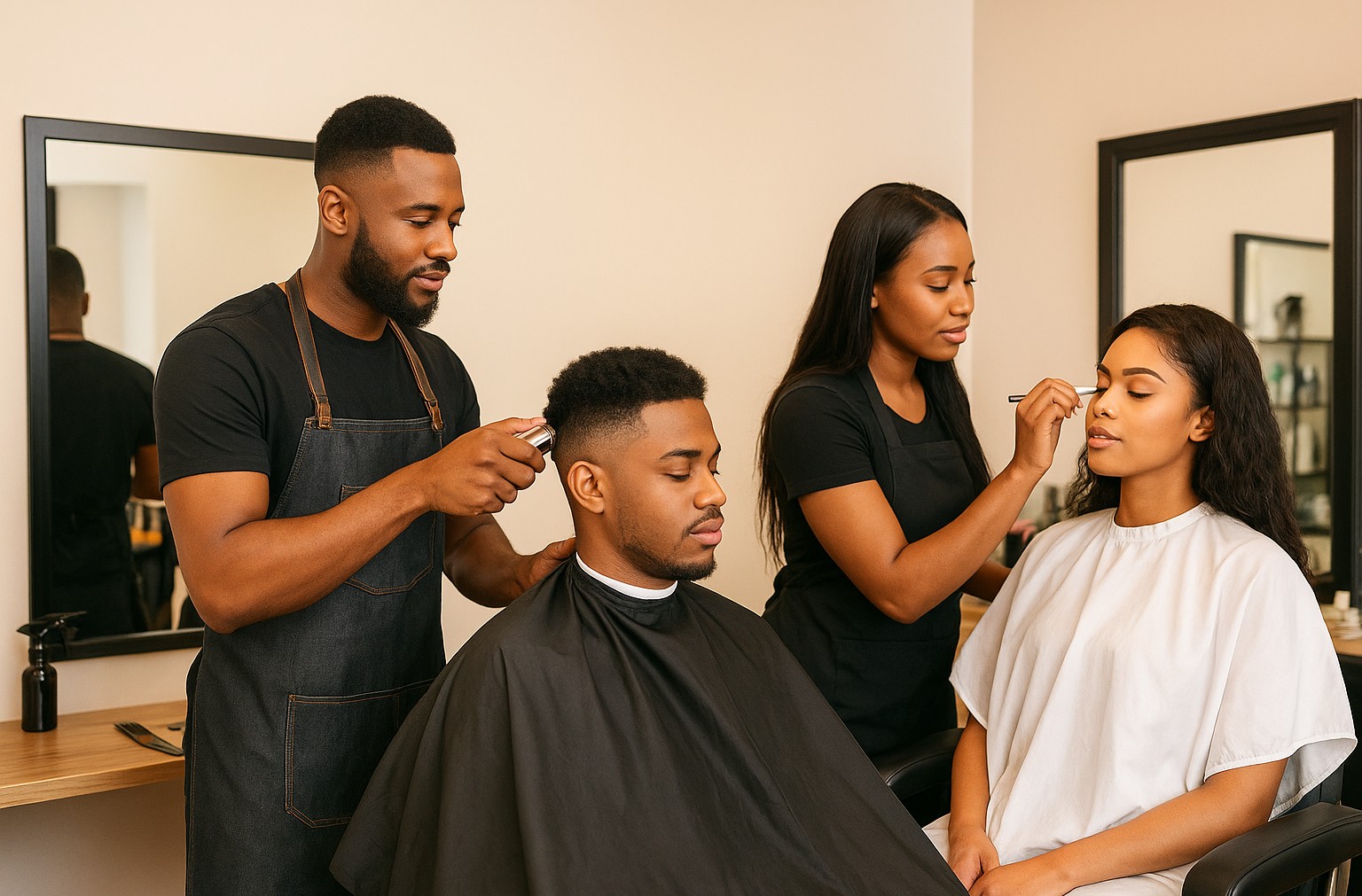

Titus Morebu
Author
How to Start a Profitable Kinyozi + Salon Combo Business in Kenya
Build a dual grooming business—barber (kinyozi) + salon—by combining smart setup, services, operations & marketing to maximize revenue and growth.
Launch a Winning Kinyozi + Salon Combo Venture 💇♂️💅
Combining barber (kinyozi) and salon services into one “barber + beauty” business can multiply your revenue streams and appeal to more clients. Here’s your step-by-step guide to launching and growing a thriving combo shop in Kenya.
Why a Kinyozi + Salon Combo Makes Sense
- Leverage cross-selling: A barber client may also want hair treatments, facials, or waxing. Salon clients might come in with partners who want haircuts.
- Maximize space & resources: Use shared water, power, waiting lounges, and staff cross-training to reduce redundant costs.
- Diverse clientele & revenue streams: Men, women, and children all become potential clients; low-margin services balance with high-margin salon offerings.
- Brand differentiation: Many places focus strictly on barbering or salons. You can stand out by offering both under one roof.
Step 1: Market Research & Business Planning
Know your target market
Walk around your intended neighborhood. Observe existing barbers and salons. What services are missing? What are their pricing levels? Talk to potential clients about their frustrations with current salons or kinyozis. The insights will guide your service mix and pricing.
Define your service offerings
Decide what barber & salon services you will offer initially, and which ones you’ll add later. Examples:
- Men’s haircuts, beard trimming, fades, neck shaves
- Women’s haircuts, blowouts, coloring, braiding
- Facials, waxing, manicure & pedicure
- Head & scalp treatments, massages, hair spa treatments
Financial projections & break-even
Sketch out realistic revenue and expense forecasts. Estimate how many clients per day per service, average ticket per client, fixed costs (rent, utilities, staff) and variable costs (products, consumables). Locate your break-even point—the number of clients or revenue per month you must hit to cover your costs.
Also build in 10–20% contingency for unexpected costs.
Step 2: Legal & Licenses – Operate Legally
Operating without the proper permits can lead to fines or closure. Key legal steps:
- Register your business entity (sole proprietorship, partnership, or limited company)
- Obtain a Single Business Permit from the county (varies by region)
- Get a Health / Hygiene Certificate to show compliance with sanitation standards
- Obtain a Fire Safety / Clearance Certificate for public safety compliance
- Register for KRA PIN and tax compliance
Ensure all staff handling chemicals or salon services have proper certification/training so you meet regulatory standards.
Step 3: Location, Space & Layout Design
Choose a high-traffic, accessible location
Areas near markets, bus stops, schools, estates, malls or busy streets offer better walk-in traffic. Visibility, parking, and ease of access matter.
Design efficient layout
Your floor plan should allow smooth client flow. Suggestions:
- Separate zones: barber / haircut area, salon / hair wash & styling, facial / waxing corner.
- Strong lighting and mirrors everywhere.
- Ventilation and odor control—exhaust fans or windows.
- Comfortable waiting area with seating, phone charging, and refreshments.
Step 4: Equipment, Tools & Supplies
Invest in reliable, professional equipment. Don’t cut so low that it hurts service quality.
- Barber chairs & salon styling chairs
- Electrical clippers, trimmers, blades (for both barber & salon use)
- Shampoo bowls, sinks, wash stations
- Mirrors, cabinets, storage for supplies
- Sterilizers, UV cabinets, sanitizers
- Salon tools: hairdryers, flat irons, curling irons, color bowls, brushes, combs
- Towels, capes, gloves, gowns
- Salon & barber product stock: hair care, styling gels, oils, creams, skin care, wax
- Waiting area furniture, décor, signage, lighting
You can phase purchases: start with essentials and gradually add specialized gear as revenue grows.
Step 5: Staffing & Training
The right people can make or break your business.
- Hire skilled barbers, stylists, and beauty therapists with proven work.
- Offer training on customer service, hygiene, upselling, and new techniques.
- Design incentive or commission systems to align employee performance with your growth goals.
- Cross-train staff so they can assist in multiple service areas during off-peak hours.
Step 6: Pricing Strategy & Service Bundling
Pricing should reflect value, local income levels, and competitive rates.
- Maintain clear, transparent menus for barber & salon options.
- Offer bundled packages (e.g. haircut + facial, cut + wash + scalp massage) at a slight discount to encourage upsell.
- Use tiered pricing—standard, premium, VIP—so clients can upgrade if they want more luxury.
- Regularly review and adjust prices based on cost changes and competitor pricing.
Step 7: Marketing, Branding & Customer Acquisition
Brand identity & visibility
Create a strong brand: name, logo, signage, interior colors, uniforms, and overall ambience that sends a clear message of quality.
Digital presence
- Set up a Google Business Profile so you show on Google Maps and local searches.
- Create social media pages (Facebook, Instagram, TikTok) and post before/after transformations.
- Use WhatsApp Business for appointment bookings, reminders and promotions.
- Encourage client reviews—good reviews pull in new clients.
Offline & community marketing
- Flyers, posters in local areas, estate entrances, and shops.
- Partnerships: team up with clothing, gym, or grooming product shops for cross promos.
- Offer launch promotions (discounts, freebies) to create buzz.
- Host small community events (style days, free beard trims) to draw foot traffic.
Step 8: Operations & Client Experience
Workflow & appointment system
Adopt a system (paper or digital) for appointments and walk-ins to reduce waiting and overlaps. Keep service flow smooth.
Hygiene & cleanliness
Strictly sterilize tools, keep floors clean, provide fresh towels and gels. Clean environment builds client trust.
Customer retention
- Collect client contact info & preferences (hair style, products used).
- Offer loyalty programs (10th service free, referral bonuses).
- Send reminders or offers to dormant customers.
Step 9: Financial Management & Scaling
Track revenue, expenses, profit margins monthly. Know which services are your highest margin.
- Reinvest part of profits into new equipment, training, or expansion.
- Introduce premium services or add wellness/spa offerings as you grow.
- Consider opening branches or franchising once your flagship location is stable.
Challenges & How to Overcome Them
- Competition: Differentiate through superior service, ambience, or special packages.
- Staff turnover: Motivate employees with fair pay, progression paths, and recognition.
- Cash flow dips: Offer promotions in slow months, manage inventory tightly.
- Regulatory compliance: Stay on top of licensing renewals and health inspections.
- Service quality consistency: Standardize processes and monitor performance.
Conclusion & Next Steps
Launching a kinyozi + salon combo business is ambitious, but done well, it unlocks multiple income streams and a broader client base. Start lean, focus on quality and consistency, build your brand reputation, and expand smartly. Your growth depends not just on tools and space—but on how well you deliver value, trust, and an exceptional experience every time. 🎯
Gallery

Related Articles
3 articles
How TitoCreations Empowers Kenyan Entrepreneurs With Smart Business Systems
Discover how TitoCreations equips Kenyan entrepreneurs with profitable business ideas and modern software systems to start, manage, and scale successful ventures.

How to Start Poultry Farming in Kenya 2026: A Complete Step-by-Step Guide to Profit
Learn how to start and run a profitable poultry farm in Kenya in 2026 with up-to-date setup, costs, management, marketing, and profit strategies.

Freelancing in Kenya: How to Start With No Experience 2026
Learn how to start freelancing in Kenya with zero experience, build marketable skills, find clients, and earn KES or dollars online in 2026.